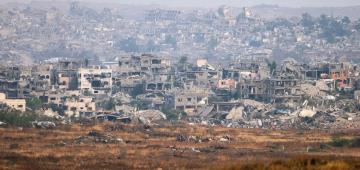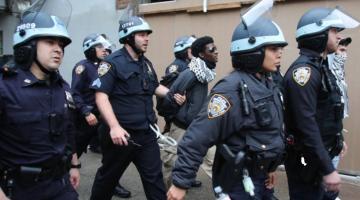BAR Book Forum: Ana-Maurine Lara’s “Queer Freedom : Black Sovereignty” and “Streetwalking”
The author wants us to deepen our analysis of how power moves through the world to constrain Black life, and how queer Black people resist these constraints.
“This book reiterates that there are communities all over the world who are mobilizing resources, stories, and occupying public space in the struggle for justice.”
In this series, we ask acclaimed authors to answer five questions about their book. This week’s featured author is Ana-Maurine Lara. Lara is Assistant Professor in the department of women, gender and sexuality studies at the University of Oregon. Her books are Queer Freedom : Black Sovereignty and Streetwalking: LGBTQ Lives and Protest in the Dominican Republic.
(Note from author: I am publishing Queer Freedom : Black Sovereignty (SUNY Press) and Streetwalking: LGBTQ+ Lives and Protest in the Dominican Republic (Rutgers Press) simultaneously. Within an Afro-cosmological worldview, they are marassa/imagua – sacred twins come down to earth to share spiritual and material wisdom. So, I speak of them here together.)
Roberto Sirvent: How can your book help BAR readers understand the current political and social climate?
Ana-Maurine Lara: In my understanding of Black life, we carry within us the memories of terror and resistance. Our current social and political climate is one defined by the ongoing perpetuation of Black death as a central component of capitalist production and white supremacist colonialism. We live with the ongoing effects of colonialism, what Anibal Quijano calls “coloniality” in which all aspects of life, being, and knowledge are shaped by the structures of colonial power. The United States has entered a new iteration of anti-Black racism and xenophobia. We are living in a time of ecological devastation, unbridled police violence, mass incarceration and neglect, increasing political chokeholds on Black communities, and the political assassination of hundreds of Black leaders across the Americas.
“We live with the ongoing effects of colonialism.”
Queer Freedom: Black Sovereignty is an examination of queer: Black ecologies and how queer: Black people embody freedom and sovereignty. The book provides language, stories and questions meant to provoke a deeper understanding of the worlds we are building in the present and into the future.
Streetwalking: LGBTQ Lives and Protest in the Dominican Republic presents lessons from the LGBTQ+ movement in the Dominican Republic, and puts language to political strategies of resistencia. The book engages with Audre Lorde’s concept of the transformation of silence (tacit subjectivity) into action and the relevance of this concept to the formation of political subjectivities.
Together, both of these books are attempting to provide readers with tools for deepening our analysis of how power moves through the world to constrain Black life, and how queer: Black people resist these constraints.
What do you hope activists and community organizers will take away from reading your book?
From my perspective, activists and community organizers outside of academia are the people providing general publics and scholars with the analysis necessary to produce social transformation. Inside academia, scholar-activists can amplify the work of those on the ground, and can also provide new theoretical language to help activists name their experiences.
I am hoping that activists and community organizers read:
Queer Freedom: Black Sovereignty as a roadmap to decolonization. As a roadmap, I hope it serves to enable activists and community organizers to deepen their commitment to their ancestors, present and future, to Afro-futuristic possibilities, and to a world where Blackness is complicit with sustaining Indigenous lives and land. This book is an offering and in that way I also hope that it provides language to heal the wounds of colonization.
I am hoping that activists and community organizers read:
Streetwalking as a reflection and as a book that provides additional language and framing for reaching across institutional boundaries. Student activists, in particular, might find it helpful to think about cuentos and “flipping the script” as modes of political activism that become increasingly significant under authoritarian regimes. For Black activists on the ground, this book reiterates that people are not working in isolation, but rather that there are communities all over the world who are mobilizing resources, stories, and occupying public space in the struggle for justice.
We know readers will learn a lot from your book, but what do you hope readers will un-learn? In other words, is there a particular ideology you’re hoping to dismantle?
With Queer Freedom: Black Sovereignty, I am hoping that readers will unlearn colonial concepts of personhood and being. This book is a ceremony, an offering. I am hoping that this book changes readers’ perceptions of what knowledge production is and can be. This book is, through and through, a discussion of how to dismantle colonization, settler colonialism and coloniality. It is a call to queer: Black people to deepen our work within that process of dismantling colonization, settler colonialism and coloniality. It asks readers to unlearn the process of reading academic works as already closed texts. It also asks us to unlearn narratives of queerness and Blackness as mutually exclusive categories of personhood, and to unlearn to read Blackness as predicated on Indigenous peoples’ extinction.
“This book is a discussion of how to dismantle colonization, settler colonialism and coloniality.”
With Streetwalking, I am hoping that readers will un-learn the many subtle ways in which we continue to invest and perpetuate Christian coloniality. Christian coloniality refers to the ongoing processes of colonization that structure knowledge, power and being within the logics of Christian moral personhood (Lara 2020). Christian coloniality requires the continual re-centering of procreative sexuality in order to perpetuate the continued expansion of Christianity and capitalism across territories and bodies necessary for the accumulation of wealth. Nonbiblical sexual and gender desires exist in excess and as affront to Christianity’s moral imperatives, thereby – from a Christian colonial worldview – necessitating the elimination of all those whose bodies and personhood refuse to conform. I would love to dismantle Christian coloniality and its attendant sexual terror altogether. I would love students to dismantle and unlearn homophobia, transphobia, misogynoir and xenophobic racism.
Who are the intellectual heroes that inspire your work?
There are so many that inspire my work. I will start with Audre Lorde, whose work on silence, the erotic and the uses of anger helped me articulate my own relationships to knowledge and power. The work of Gloria Anzaldúa, Maria Lugones, Édouard Glissant, Frantz Fanon and Sylvia Wynter has helped me expand my theorizations of consciousness and being. Encountering Leanne Betasamosake Simpson’s work so late in my life had me feeling some kind of way about not having encountered it sooner. Her work on radical resurgence, and on gender, have helped me think through what it means to decolonize our relationships to language.
The first two pages of the introduction of Queer Freedom: Black Sovereignty are a moyumba and welcoming of my intellectual heroes, both ancestors and present, into the space of the book. I will not replicate this list here, but it also lists Caribbean Indigenous and Black women military leaders, whose intellect was central to sixteenth and eighteenth movements for Black sovereignty.
My intellectual heroes for the book Streetwalking are the LGBTQ+ activists I worked with over the course of my fieldwork. In particular Myrna Hernandez Nuñez, Deivis Ventura, Carlos Rodríguez, Rosanna Marzán, Chris Dumont, Shakira, Antonio E. De Moya…they are my intellectual heroes on that project.
In what way does your book help us imagine new worlds?
Queer Freedom: Black Sovereignty is divided into ceremonial components: the opening ceremony, altars-puntos, body-lands, water-memories, war, and the closing ceremony. I am asking people to reimagine what it means to exist in the world, and what it could look like to exist as beings always already in relation. The text itself is an imagining of the world that centers new kinds of understandings about what altars are, what the body is, what water is and what war is. In this time of ecological devastation, uncontrollable illness and socio-political turmoil, this book offers a pause and a breath to enable readers to imagine freedom and sovereignty.
With Streetwalking, I am asking people to imagine a world where Christian coloniality is no longer the defining ideological and institutional structures of our world. Rather than just suggest the possibility of colonial difference as a space for alterity and resistance, I am hoping to point readers to examples of the kinds of techniques and possibilities available to us in the construction of our past-present-future archives of protest, friendship and love. By deconstructing the various ways in which Christian coloniality structures intimate and public lives, I hope readers will gain a critical lens that enables them to then re-imagine what our futures can be like without it.
Roberto Sirvent is Professor of Political and Social Ethics at Hope International University in Fullerton, CA, and an Affiliate Scholar at Yale University’s Interdisciplinary Center for Bioethics, where he directs the Race, Bioethics, and Public Health Project. He is co-author, with fellow BAR contributor Danny Haiphong, of the book, American Exceptionalism and American Innocence: A People’s History of Fake News—From the Revolutionary War to the War on Terror.
COMMENTS?
Please join the conversation on Black Agenda Report's Facebook page at http://facebook.com/blackagendareport
Or, you can comment by emailing us at comments@blackagendareport.com



















